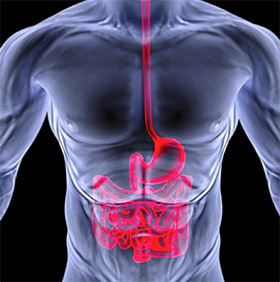If you suffer from IBS then you know that difficulties with digestion can cause a lot of pain and discomfort. So, if there’s a way to ease these symptoms, chances are you want to know about it! One thing that a lot of individuals with IBS are not aware of is that a condition called SIBO (small intestine bacterial overgrowth) can be the cause behind IBS symptoms. In this article Dr. Bristow explains SIBO, the importance of the proper amount of bacteria in your digestive tract, and outlines steps that you can take to help restore your body’s natural balance.
If you’ve been struggling with your digestive system, perhaps diagnosed with irritable bowel syndrome (IBS), and you’ve been reading up on food sensitivities and leaky gut, then this article is for you! Small intestinal bacterial overgrowth (SIBO) is a common culprit behind IBS. Yes, there is a reason you have poor digestion! It’s not all in your head, and no: you do not need an antidepressant for it.
What are the symptoms of SIBO?

- Abdominal bloating, discomfort or pain after meals
- Excessive burping and/or excessive flatulence
- Nausea, heartburn and/or regurgitation of food
- Sensation of fullness and slow digestion
- Chronic loose stools
- Chronic constipation, or…
- Alternating bouts of loose stool & constipation
What is SIBO and how is it treated?
Small Intestinal Bacterial Overgrowth (SIBO) is related to an excess of bacteria in the small intestine. Normally, in our small intestines we have between 10 thousand to 10 million colony forming units (CFU) of bacteria. And within our large intestine (colon) we have 10 billion to 10 trillion CFU of bacteria. That is a massive difference! When these numbers are thrown out of whack and bacteria builds up in the small intestines, the symptoms of overgrowth make themselves known.
Why is it a problem to have too much?”
In the large intestine, bacteria are needed to produce vitamins B1, B2, B6, B12, vitamin K and help make short chain fatty acids. They also assist in the transformation of digested material into feces and play a major role in the digestive immune system (read this for more info!) But, bacteria love sugar, and by the time this (nearly completely digested material) reaches your large intestine–where the majority of your bacteria live–the glucose has already been absorbed by your body. Now imagine you had an abundance of bacteria in the small intestines happily gobbling up all the sugar; when this is the case, a lot of gas is produced, hence all the bloating, flatulence, and/or burping! It also really slows down the system, making you feel bloated from even small amounts of food, and often leaves you feeling as if food is taking forever to migrate out of your stomach.
There are a lot of “behind the scenes” details on how and why this overgrowth develops. Incorporating these factors into treatment, along with a rotation of antimicrobial herbs to eradicate the overgrown bacteria, is what ensures long lasting recovery. SIBO is also something we can test for: a three-hour breath test following a liquid solution captures the gases produced by bacteria in the small intestines. The results show not only a positive or negative reading, but also give greater detail. These results actually tell us where along the small intestines the majority of the bacteria reside and what type they are, further helping us to target them specifically.
Among those struggling with IBS, up to 85% have tested positive for SIBO. When treated for SIBO, IBS symptoms have been seen to significantly decrease or even be eliminated fully. This has been under investigation for the past 15 years and is gaining traction as a potential cause of IBS. A Naturopath trained in SIBO can guide you through the process of testing (test kits are provided by Naturopaths), eradication, re-stimulation, and recovery.
Curious? Book an appointment or 15-minute meet and greet with me and let’s talk SIBO!
Thanks for reading and happy digesting :)
